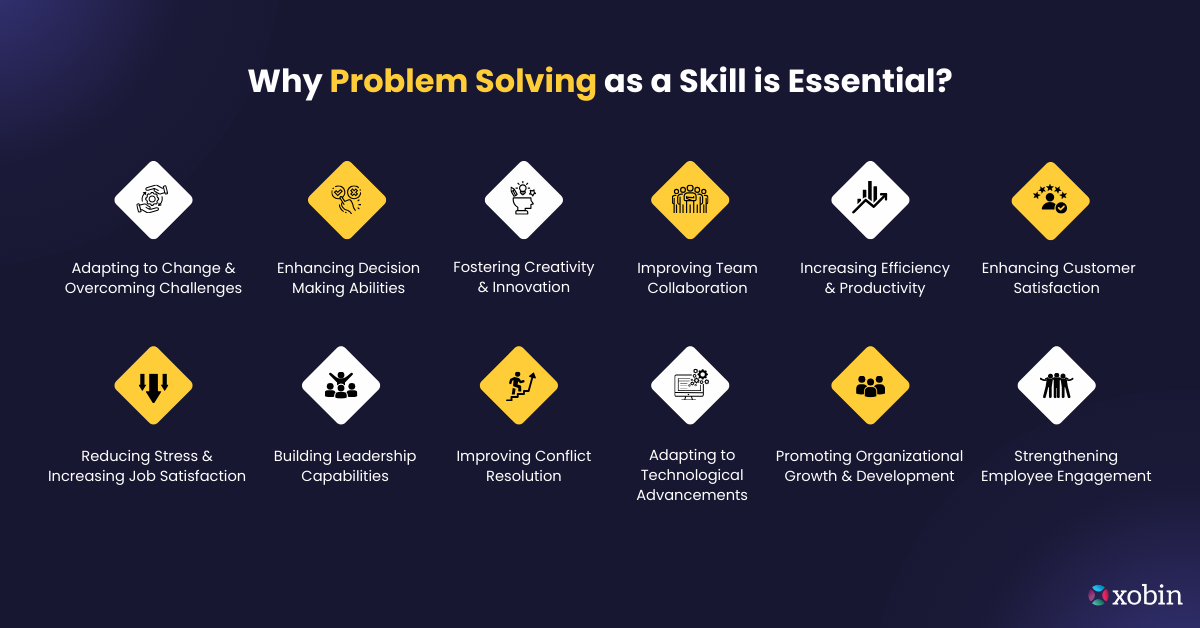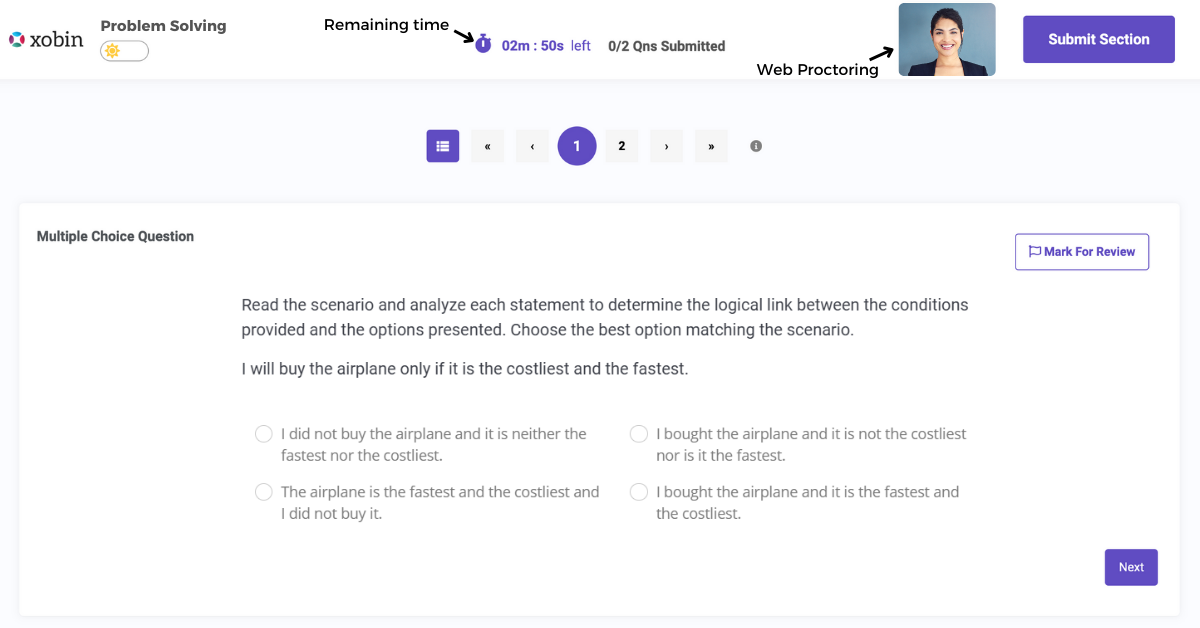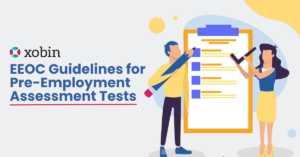In both our personal and professional lives, we often face challenges that require critical thinking and quick decision-making. But what skill enables us to handle these situations with confidence? The answer is problem solving. Whether you are a recruiter or someone looking to make more informed decisions, mastering problem-solving is crucial. For recruiters, identifying candidates with problem-solving abilities is vital. Candidates who exhibit this skill demonstrate more than just what’s listed in the job description. Their ability to approach and overcome challenges sets them apart from the rest, making pre-employment testing an essential tool for effective hiring.
Table of Contents
So, how can you ensure you’re hiring candidates with strong problem-solving abilities? In this blog, we’ll dive into why problem-solving is important and explore effective methods to assess it. This way, you can hire individuals who offer more than just technical skills, ultimately driving success for your organization.
What is Problem Solving?
Problem solving involves identifying challenges, analyzing them, and developing effective solutions. It’s not just about fixing problems but it’s about improving situations, streamlining processes, and preventing future issues. Think of it as connecting the dots: problems often aren’t immediately obvious, and solving them requires a thoughtful approach.
Problem solving has a powerful Psychological Benefits–
- Boosts Confidence: Overcoming challenges fosters a sense of accomplishment, enhancing self-esteem.
- Reduces Stress: Knowing how to solve problems makes you feel more in control, reducing anxiety.
- Encourages Lifelong Learning: Solving problems often requires learning new skills, keeping your mind sharp and engaged.
Effective Problem Solving Steps One Must Follow
Identify the Problem
To begin solving a problem, one must first comprehend it. Investigate the root cause—whether it’s a process issue, a communication breakdown, or a team conflict. Gather relevant facts and engage with those involved. Think of it as piecing together a puzzle to see the bigger picture.
Analyze the Problem
Once you’ve pinpointed the issue, dig deeper to understand why it’s happening. Ask targeted questions like, “What is causing this?” or “What led to this situation?” Techniques like the “5 Whys” can assist you in removing the layers and identifying the main issue.
Brainstorm Solutions
Let creativity take center stage. Collaborate with your team and generate a variety of ideas. Foster an open-minded environment because unconventional solutions often hold the key to resolving complex challenges.
Evaluate and Choose the Best Solution
Not every solution will suit every problem. Assess each option by weighing its advantages and drawbacks. Take into account elements like cost, viability, and long-term effects. It’s similar to selecting the perfect tool for a task—choose the one that delivers results effectively.
Implement the Solution
Once you’ve selected the best approach, take action. Communicate the plan clearly, set expectations, delegate responsibilities, and provide necessary resources. Remember, even the most brilliant ideas can fail if they’re not executed properly.
Monitor and Adjust
Implementation is not the end of the journey. Continuously monitor the outcomes and remain open to adjustments. Treat this phase like fine-tuning a machine. Because small changes can significantly improve performance and ensure lasting success.
Why Problem Solving as a Skill is Essential?

Adapting to Change and Overcoming Challenges
The workplace is constantly changing—whether it’s new technology, shifts in market demand, or internal restructuring. Employees who excel at problem solving are better equipped to handle these changes and challenges. Instead of feeling overwhelmed by unexpected obstacles, they view them as opportunities to think critically and find innovative solutions.
For example, when a company adopts a new software tool, employees with strong problem resolution skills can quickly adapt to the changes, resolve issues independently, and help others navigate the transition. This proactive approach not only reduces downtime but also boosts overall productivity and morale.
Enhancing Decision-Making Abilities
Effective decision-making is closely tied to problem solving. When employees are presented with complex situations, those with strong problem solving abilities can break down the problem, evaluate possible solutions, and choose the best course of action. This results in more informed, confident decisions that lead to positive outcomes for the company.
A problem solving mindset allows employees to evaluate all the variables involved, consider both short-term and long-term effects, and assess risks before making decisions. This thoughtful decision-making process is crucial, especially in high-stakes environments where the wrong choice can have significant consequences.
Fostering Creativity and Innovation
One of the most significant benefits of problem solving is that it fuels creativity and innovation. When employees encounter problems, they are forced to think outside the box and come up with creative solutions. This creative thinking can lead to new ideas, processes, or products that drive the company forward.
For instance, a team that faces a challenging client project may come up with a unique approach that results in a highly successful outcome. These moments of creative problem solving can be the catalyst for breakthrough innovations that set the company apart from its competitors.
Improving Team Collaboration
Problem solving is rarely a solo activity in the workplace. Many times, teams must collaborate to find solutions to complex issues. Strong problem solvers know how to communicate effectively with team members, gather input, and consider diverse perspectives when tackling a problem. This collaboration fosters a sense of unity and ensures that the team can leverage everyone’s strengths to arrive at the best solution.
Moreover, a team that collaborates well is better equipped to handle setbacks or failures. When a solution doesn’t work as expected, problem resolution skills come into play again, enabling the team to adjust their approach and keep working toward a successful resolution.
Increasing Efficiency and Productivity
Problem solving skills directly impact a company’s efficiency and productivity. Employees who are skilled problem solvers can identify bottlenecks, eliminate obstacles, and streamline processes. They are less likely to waste time on ineffective solutions and more likely to find the most efficient way to accomplish a task.
This skill is particularly valuable in fast-paced environments where time is a precious resource. A problem solving approach helps employees prioritize their efforts, stay focused on the task at hand, and eliminate unnecessary steps, ultimately increasing their productivity.
Enhancing Customer Satisfaction
In customer-facing roles, problem solving is crucial for resolving customer issues in a timely and effective manner. Employees who can think on their feet and resolve customer complaints or concerns quickly not only improve customer satisfaction but also enhance the company’s reputation.
For instance, when a customer faces a problem with a product or service, an employee with strong problem resolution skills can find a solution that meets the customer’s needs, often turning a negative experience into a positive one. This ability to resolve problems efficiently fosters customer loyalty and trust.
Reducing Stress and Increasing Job Satisfaction
Stress at work often arises from challenging or unanticipated issues. Employees who lack a problem solving approach may feel overwhelmed and unsure of how to handle these challenges. In contrast, individuals who are confident in their ability to tackle problems are less likely to experience stress, as they know they can find solutions.
Furthermore, employees who successfully solve problems often feel a sense of accomplishment and satisfaction. This boosts morale and job satisfaction, leading to greater engagement and retention. When employees are equipped with problem resolution skills, they are more likely to feel confident and capable in their roles.
Reducing Stress and Increasing Job Satisfaction
Problem solving is a key leadership trait. Leaders who can effectively solve problems not only demonstrate their value but also inspire confidence in their teams. When leaders model problem solving behaviors, they encourage their teams to adopt the same mindset, creating a culture of continuous improvement and adaptability.
In situations where teams are facing difficult challenges, a leader who excels at problem solving can guide the team through uncertainty and provide direction. This type of leadership fosters trust, loyalty, and respect, making problem solving a crucial skill for leadership development.
Improving Conflict Resolution
Conflicts are inevitable in the workplace, whether between team members, departments, or with clients. Strong problem solvers are effective at resolving conflicts by identifying the root causes, considering the perspectives of all parties involved, and finding mutually beneficial solutions. This approach not only resolves the conflict but also strengthens relationships within the organization.
When conflicts are handled with effective problem solving, it minimizes disruptions and creates a more harmonious work environment. Employees are more likely to feel supported and valued, reducing the likelihood of future conflicts.
Adapting to Technological Advancements
As technology continues to evolve, employees must be able to problem-solve in the face of new tools, platforms, and systems. Those with strong problem solving abilities can quickly learn to use new technologies, troubleshoot technical issues, and find ways to integrate them into their work processes.
By adapting to technological changes swiftly, employees contribute to the overall agility of the organization. A workforce that embraces technological advancements and problem solving is better positioned to stay ahead of competitors and meet evolving industry demands.
Promoting Organizational Growth and Development
Organizations rely on their employees’ problem solving abilities to identify opportunities for growth, improve operations, and drive success. A company that fosters a culture of problem solving encourages its employees to think critically about the company’s objectives, challenges, and future direction. This mindset is essential for identifying areas for improvement and growth, enabling the company to stay competitive in the marketplace.
Moreover, employees who are empowered to solve problems contribute to a continuous feedback loop, where solutions lead to further improvements and innovations. The organization as a whole and individual employees both benefit from this continuous development.
Strengthening Employee Engagement
When employees feel empowered to solve problems and make decisions, they are more likely to be engaged and committed to their roles. Problem solving methods give employees a sense of ownership over their work, as they can directly contribute to the company’s success by finding effective solutions.
Engaged employees are more likely to stay with the company, take initiative, and seek opportunities for personal and professional growth. This, in turn, boosts retention rates and ensures that the organization has a motivated and dedicated workforce.
Top Skills that Candidates Need to Solve Problems Faster
1. Critical Thinking
Critical thinking is the foundation of problem solving. This skill allows individuals to objectively analyze a situation, break it down into smaller components, and evaluate the various possible solutions. To make wise decisions, it entails challenging presumptions, taking into account many viewpoints, and assessing the available data. In a professional setting, critical thinking helps individuals avoid jumping to conclusions and ensures that all relevant information is taken into account.
You can use Critical Thinking Test to assess a candidate’s ability to think logically, identify assumptions, and recognize patterns within complex data. The result of the test to help understand critical thinkers can come up with well-rounded solutions that are both effective and feasible.
2. Creativity
Problem-solving is not just about logic and reasoning; creativity holds equal significance. Creative individuals excel at thinking outside the box, offering innovative solutions that others might overlook. By breaking free from conventional thinking, they explore fresh perspectives and uncover new possibilities when faced with challenges.
This skill becomes crucial when traditional approaches fall short or solutions appear limited. Creative problem solvers embrace experimentation and willingly try new methods. They embrace failures as chances to grow and learn. This mindset drives continuous growth and fuels innovation, making creativity indispensable for tackling complex problems.
3. Decision-Making Ability
Once the problem is identified and potential solutions are proposed, making quick and effective decisions is crucial. Decision-making involves evaluating all the available options, weighing the pros and cons, and choosing the most suitable course of action. Strong decision-making abilities help reduce delays and ensure that solutions are implemented without unnecessary hesitation.
A balance between intuition and reasoning is necessary for making wise decisions. While data and facts are essential, a good decision-maker also trusts their instincts when faced with uncertainty or incomplete information.
Decision-Making Test evaluates candidates’ ability to make sound choices under various scenarios. This test is designed to assess how well candidates weigh pros and cons, consider long-term consequences, and choose the best solution based on available information.
4. Emotional Intelligence (EQ)
Emotional intelligence (EQ) describes the capacity to identify, control, and affect your own emotions as well as those. When it comes to problem solving, EQ is particularly important for managing stress, remaining calm under pressure, and collaborating effectively with others.
Emotional intelligence helps an individual stay focused on the task at hand without letting frustration or anxiety cloud your judgment. Furthermore, it plays a significant role in working with others to find solutions, as it enables them to communicate more effectively and build stronger team dynamics.
7. Attention to Detail
In problem solving, overlooking small details can lead to bigger issues down the line. Attention to detail is the ability to spot discrepancies, identify potential problems, and ensure that all aspects of a problem are considered before implementing a solution. Problem solvers with high attention to detail prevent mistakes and ensure thorough, accurate solutions.
You can use Attention to Detail Test to evaluate a candidate’s ability to spot errors and inconsistencies in information. It’s a great tool for assessing candidates in roles where precision and accuracy are critical, such as in quality control, software development, or data analysis.
6. Communication Skills
Clear and concise communication skills are essential, particularly when working in teams. The ability to articulate your ideas, explain your reasoning, and listen to others’ perspectives helps ensure that everyone involved is on the same page. Good communication promotes collaboration, reduces misunderstandings, and fosters an environment where ideas can be shared freely.
In addition to testing verbal communication, non-verbal communication, such as body language and tone, also plays a role in problem solving. Being able to convey your thoughts effectively without causing confusion or conflict is a crucial aspect of successful problem solving. Xobin’s Communication Checker Tool stands out as a game-changer in this space. This AI-driven solution evaluates speaking, listening, and writing abilities with unmatched precision.
7. Collaboration and Teamwork
Problem solving is often most effective when done in collaboration with others. Teamwork allows individuals to combine their unique strengths, perspectives, and skills, leading to more well-rounded solutions. In many cases, diverse teams can come up with creative and innovative ideas that an individual might not have considered on their own.
Successful collaboration also involves effective delegation, where tasks are assigned based on team members’ strengths. When everyone works together efficiently, problem solving becomes a shared responsibility, reducing the burden on any one individual.
8. Analytical Skills
Analytical skills are essential for breaking down difficult issues into smaller, more manageable parts. These skills help you identify patterns, draw connections, and make sense of large amounts of data. Strong analytical thinkers are able to discern key details that might otherwise be overlooked, allowing them to identify the root cause of a problem rather than just addressing its symptoms.
Using Analytical Thinking Test helps identify candidates who excel at breaking down complex issues. It assesses their ability to interpret data, draw conclusions, and understand relationships between various factors. This skill is particularly useful in fields where analyzing large datasets or troubleshooting technical issues is required.
9. Time Management
Problem solving often involves tight deadlines and the need to make quick decisions. Time management skills are critical in ensuring that solutions are implemented efficiently and within the required timeframe. Effective time management helps individuals prioritize tasks, allocate resources appropriately, and avoid distractions that could delay problem solving.
Time Management Test helps assess how well candidates manage their time when working through problems. This test is useful for roles that require juggling multiple tasks or solving urgent issues within tight time constraints. It evaluates the candidate’s ability to prioritize and stay organized in problem solving scenarios.
10. Resourcefulness
Resourcefulness is the art of finding smart and efficient solutions to challenges, even when resources are limited. It empowers individuals to tackle problems by thinking outside the box and making the best use of what’s available. This skill shines in scenarios where constraints like time, budget, or materials exist. The resourceful people proactively explore solutions and embrace creativity when conventional methods fall short.
How to Evaluate Problem Solving Skills of Candidates?
1. Start with Problem Solving Test in Your Screening Process

Problem solving test are one of the most effective ways to assess a candidate’s ability to think critically and find solutions under pressure. A Problem solving tests typically includes scenarios or exercises that require candidates to apply logic, creativity, and analytical thinking. By incorporating these tests into your hiring process, you can measure how well candidates perform when confronted with real-world challenges.
2. Simulate Real-World Challenges with Case Studies
Case studies offer a great way to assess how candidates approach real-world business problems. By presenting candidates with a case study relevant to the role they’re applying for, you can evaluate their ability to break down complex problems and present structured, actionable solutions.
A well-structured case study should present a problem that requires analysis, data interpretation, and decision-making. Candidates will need to evaluate the situation, explore various potential solutions, and recommend the best course of action.
3. Ask the Right Questions with Behavioral Interviews
Behavioral interviews are a tried-and-true method for evaluating problem solving skills. The idea behind a behavioral interview is simple: you ask candidates to provide examples of how they’ve solved problems in previous roles. By doing so, you can gain insight into their problem solving mindset, approach, and ability to handle challenges. They are rooted in the premise that past behavior is the best predictor of future performance. If a candidate has solved complex problems in the past, they are likely to do so again in the future.
4. Use Role-Playing Scenarios
Role-playing exercises are another excellent way to evaluate problem solving skills in real time. By putting candidates in hypothetical situations and asking them to take on specific roles, you can observe how they think and react in dynamic situations. These scenarios allow you to see how candidates perform under pressure. It also tests their ability to communicate and collaborate, which are critical components of problem solving.
5. Assess Analytical Thinking with Puzzles and Brain Teasers
Many recruiters and HR professionals incorporate puzzles and brain teasers into their hiring process to test a candidate’s problem solving abilities. These exercises challenge candidates to think on their feet, find patterns, and come up with creative solutions to seemingly simple yet difficult problems.
Puzzles and brain teasers allow recruiters to evaluate a candidate’s logical thinking and problem solving method in a controlled, timed environment. It gives insights into how they break down problems and approach decision-making.
6. Evaluate Problem Solving Through Team Collaboration
Problem solving often involves teamwork, especially in larger organizations. Therefore, assessing a candidate’s problem solving techniques should also include evaluating how they collaborate with others. One effective way to do this is through group exercises or collaborative problem solving tasks.
You can set up a group discussion where candidates work together to solve a business problem or come up with creative solutions. Observing how they interact with others, communicate ideas, and contribute to finding a solution will give you a good idea of their collaborative problem solving approach.
7. Test their Technical Problem Solving Skills
If you’re hiring for a technical role, testing a candidate’s technical problem solving skills is essential. This can include coding challenges, troubleshooting tasks, or technical exercises related to the field. For example, if you’re hiring a software developer, you might ask them to solve a coding problem on the spot.
Testing technical problem solving ensures that the candidate possesses the necessary skills to handle complex challenges that are specific to their role. It also lets you see how they approach and break down technical issues.
8. Gauge Emotional Intelligence in Problem Solving
Problem solving is not just about logic; it also requires emotional intelligence (EQ). A candidate’s ability to manage stress, remain calm under pressure, and navigate interpersonal conflicts is crucial to effective problem solving. Including questions or assessments that evaluate EQ can help you understand how candidates deal with the emotional aspects of problem solving.
Emotional intelligence plays a significant role in problem solving, especially in high-pressure situations. Assessing EQ gives you insights into how candidates handle challenges that may involve multiple stakeholders or sensitive emotions.
9. Incorporate Feedback Loops and Iteration
A strong problem solver understands that the first solution is not always the best solution. They embrace iteration, taking feedback and continuously refining their approach. You can test this aspect of problem solving by presenting candidates with feedback after they present a solution to a problem.
Ask them how they would improve their approach based on your feedback. Candidates who embrace this iterative process demonstrate that they’re open to learning and adapting, which is a key characteristic of strong problem solving skills.
10. Monitor Problem Solving Through Simulation and Gamification
Gamification is revolutionizing recruitment by making assessments more interactive and insightful. Through simulation-based games that mirror real-world scenarios, you can evaluate how candidates tackle challenges in an enjoyable and engaging manner. These games go beyond assessing problem-solving skills. They also measure creativity, teamwork, and adaptability.
By introducing gamified problem-solving tests, the process becomes less formal, helping candidates showcase their true potential without the stress of traditional interviews. This approach not only creates a relaxed atmosphere but also enhances the candidate experience, making the evaluation process both effective and enjoyable.
Test Problem-Solving with Xobin!
Problem solving is one of the most sought-after skills in today’s competitive job market. With Xobin’s Problem Solving Test, evaluating this skill has never been easier. Whether you’re hiring software engineers, marketing experts, or customer service professionals, our platform offers 3400+ skills tests for each role, ensuring tailored assessments that match your unique requirements.
Empower your organization by identifying top talent who excel at problem solving, and build a workforce that drives innovation. Want to experience how it works? Book a Personalized Demo with our team to see how Xobin can transform your hiring process.






